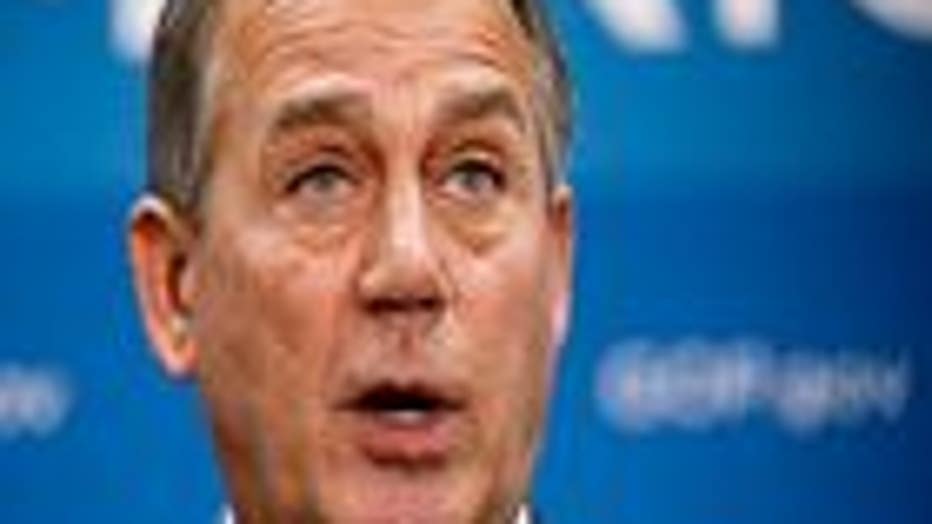As GOP infighting persists, threat of government shutdown heightens
By Lisa Mascaro and Michael A. Memoli, Los Angeles Times
WASHINGTON — Options for keeping the federal government open narrowed Thursday as some of the most conservative Republicans in the House rebuffed proposals from Speaker John A. Boehner, who had aimed to break a stalemate over the federal budget.
The opposition from conservatives to any measures that fall short of their goals of cutting federal spending or dismantling President Obama's healthcare law left the Ohio Republican with little room to maneuver as a Monday night deadline approached for providing money to keep federal agencies running.
The administration has already started plans for a possible shutdown and intends to notify federal employees Friday about whether they will be furloughed if nonessential functions are halted.
Boehner emerged from a closed-door Republican strategy session trying to drag the president into a broader debate over fiscal policy as it became clear that Congress was running out of time. "The president says, 'I'm not going to negotiate,'" the speaker said. "Well, I'm sorry, but it just doesn't work that way."
A top White House official compared House Republicans to terrorists and said the president would not bargain with Congress on the need to raise the debt limit by Oct. 17 to keep paying the nation's bills.
"What we're not for is negotiating with people with a bomb strapped to their chest," Dan Pfeiffer, a senior advisor to the president, said on CNN's "The Lead with Jake Tapper." "We're not going to do that."
With the collapse of the Republican strategy in the Senate to stop the Affordable Care Act, debate has shifted to the House, where lawmakers are planning a weekend session with no clear path forward.
Senate Republicans had hoped to bounce the government funding bill back to the House, where their GOP colleagues could attach more modest attempts to chisel away at Obamacare, such as repealing the law's medical device tax or the mandate that Americans have health insurance or pay a fine in 2014.
But the most conservative House Republicans shrugged off those ideas Thursday as inadequate and dismissed the leadership's attempt to fast-forward to the next battle with the White House on the debt limit.
"For me, it's really about finishing the debate on the CR," said Rep. Mark Meadows (R-N.C.), using an abbreviation for the continuing resolution to fund the government.
Democratic senators have made it clear they will remain united against efforts to dismantle the president's top legislative achievement and will strip those provisions from any government funding bill.
Boehner hoped to open a new front by shifting the focus to the debt limit legislation. The Republican leadership loaded up the debt bill with a proposed one-year delay of Obamacare and other demands, including that the administration approve construction of the Keystone XL oil pipeline between Canada and the United States. But conservatives said the bill did not fulfill leadership promises to cut spending and balance the budget in 10 years.
Lawmakers said a whip count showed lagging support hours after the bill was presented.
Meanwhile, an effort in the Senate to wrap up work Thursday on the government funding bill was thwarted by Sens. Ted Cruz (R-Texas) and Mike Lee (R-Utah), who insisted on delaying the final votes until Friday.
Their resistance led to a highly unorthodox display of GOP infighting on the Senate floor, reflecting the frustration of other Republicans who wanted to give Boehner more time to resolve the House stalemate.
Sen. Bob Corker (R-Tenn.), his voice tinged with sarcasm, asked why Cruz and Lee were delaying the vote until Friday, suggesting it was because they had notified supporters to watch then.
"Is it more important to the senator from Texas and the senator from Utah that the people around the country watch this vote," Corker asked, "or is it more important to us that we have a good policy outcome?"
Cruz, an arm's length from Corker in the chamber, engaged in a spirited argument with him before Cruz and Lee left the floor visibly upset.
"Friday is the appropriate time where the American people can be engaged," Cruz said afterward.
Federal supervisors will tell employees by the end of the day Friday if they can expect to work next week or be furloughed if the government is forced to cease all but the most crucial functions.
"They're very, very worried," said J. David Cox, the president of the American Federation of Government Employees, a labor union that represents 650,000 federal workers. "Most members make $35,000 to $40,000 a year. That's not of a lot of money. Let's be real, they're living paycheck to paycheck."
Shutdown plans are expected to be similar to the ones made in 2011, in advance of a stoppage that was narrowly avoided. If those earlier plans are an indication of who would stay on the job this time, Forest Service firefighters would keep monitoring the Rim fire still smoldering in California and most employees would report for work at the Federal Emergency Management Agency, which has opened disaster centers in Colorado to provide flood relief.
More than 90% of the Smithsonian's 6,400 workers would be furloughed and all its facilities, including the museums and the National Zoo, would close, according to a spokeswoman.
Those who faced furloughs under the 2011 plans included more than 80% of the National Park Service's 20,000 employees. In 1996, the last time the government shut down, parks and monuments across the country were closed, deterring an estimated 9 million people who would have visited.
Becca Clemons in the Washington bureau contributed to this report.


